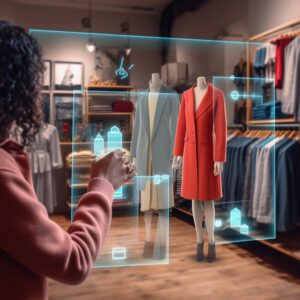Between COVID-19, the Black Lives Matter protests in the summer and the recent insurgence at the United States Capitol, 2020 was a landmark year for organizations to speak out, raise awareness and drive positive change for the world around them.
Corporate Social Responsibility (CSR) — also known as Environmental, Social, and Governance (ESG) or purpose-driven business strategy — certainly isn’t new. However, the events of the past year have inspired consumers to pay closer attention to the words and actions of businesses, a trend that is driving urgency among organizations, especially consumer brands and retailers.
“Social movements taking place around the world are causing and forcing retailers and brands to reflect on what they stand for,” said Stephanie Wissink, Managing Director of Consumer Research at global investment banking firm Jefferies during an NRF panel session. “Being a socially responsible company is no longer a point of distinction; it’s the expectation among stakeholders, including customers, employees and capital investors.”
As social responsibility becomes more embedded into the fabric of modern businesses, executives need tangible steps and best practices to ensure they’re acting thoughtfully and authentically. During the session titled: Social Responsibility at the Home Depot and Ulta Beauty Build Authentic Relationships, executives shared their priorities and lessons by zeroing in on three key strategic questions:
- Why is social responsibility important for our business?
- Who needs to be involved in developing the overall mission and vision for the business?; and
- How can retailers best prioritize their efforts and investments, while remaining agile and responsive to new issues?
1. Why is social responsibility important for our business?
Although CSR has been a hot topic in the business world for many years, it has always been perceived as a cost center, not a revenue generator, according to Kendra Clarke, VP of Data Science and Product Development for sparks & honey, a cultural consultancy. However, much of Clarke’s research has confirmed that cultural alignment has a tangible impact on revenue.
“Action cements a connection with a considerable consumer base,” Clarke said. “Gen Z, millennials and consumers in general are very interested in ensuring the brands they buy from align with their individual value sets. They’re looking to have the closest, deepest relationships with brands they feel are making positive change in the world.”
Ulta Beauty President Dave Kimbell agreed, noting that CSR also can guide long-term strategy, positioning and community development. Building a values-based culture helps ensure “everybody in the company is aligned with where we’re headed, and making sure we’re showing up in the world in the right way,” he noted.
2. Who needs to be involved in developing the overall mission and vision for the business?
All panel participants agreed that in order to truly become a socially responsible organization, everybody needs to be involved — from the frontline to the executive suite. That is why both The Home Depot and Ulta Beauty take a holistic approach to social responsibility that touches store associates, managers, executive leadership, and even brand partners and suppliers.
Advertisement
Ron Jarvis, Chief Sustainability Officer for the Home Depot, noted that the home improvement retailer takes a bottom-up approach to strategy, so the people at the top who have influence can “help the organization do the right thing.”
Kimbell explained further that while leaders of the company should drive the agenda and set high-level expectations and key performance indicators, “something as big, important and all-encompassing as the collective impact on each other, our guests and the world around us, it takes all of us. If the team isn’t feeling connected and the values aren’t aligned with theirs then we haven’t done our job.”
Listening and learning from associates “on the ground” who are engaging in local communities and interacting with customers is crucial to ensuring the organization is focusing on issues that matter most to people — and that they’re being addressed effectively.
“Make sure the most affected people have a stake in things and have a voice in the room,” Clarke advised. “Otherwise, you can’t come up with the best ideas and actions to address what you’re actually trying to change about your organization and in the world.”
3. How can retailers best prioritize their efforts and investments, while remaining agile and responsive to new issues?
“The world never sits still and 2020 was a big example of that, so we have to be agile,” Kimbell said. Because Ulta is a values-driven organization, the company has been able to be flexible and reactive to new issues in a way that is still relevant to the larger mission and vision for the business.
“We know we’re not perfect and don’t have all the answers,” Kimbell added. “We look all around us, whether it’s our brand partners or others outside of Ulta Beauty to help us understand and see the world in a holistic way…to make sure the way we’re leading our teams is aligned with what’s most needed in the world.”
Like Ulta Beauty, The Home Depot zeroes in on the key environmental and sustainability issues that impact the business at a high level. This helps form a long-term strategy that makes adapting and pivoting easier as new issues and current events arise.
“When you know what your impacts are as a company, there are no surprises,” Jarvis explained. For The Home Depot, environmental “impacts” fall into five key buckets: carbon emissions, chemical exposure, deforestation, water usage and waste/recycle. Jarvis’ goal is to know what the current impacts are, and how these impacts will change several months or years into the future so the retailer can plan more flexibly yet proactively. “If you can get in front of [these impacts], it seems like your agility is always on point.”
To ensure his team is actively adhering to their sustainability vision, Jarvis ensures a lot of time is spent listening, researching and responding to new issues from outside parties. He wants to hear concerns from all individuals who reach out, “whether they’re a part of Greenpeace or a high school senior,” and immediately develop a plan to action. “When someone says there is a concern and the Home Depot needs to move in a certain direction, we immediately go after that…we start a workstream to look into the issue and see if it’s valid.”









